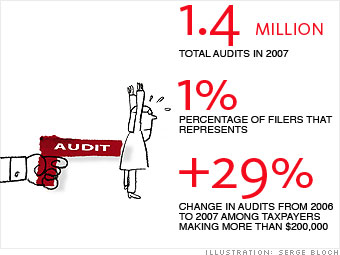
Nobody outside the IRS knows for sure how the nonrandom returns are identified - and the agency isn't telling. But most tax experts agree that having outsize deductions is one red flag.
Martin Kaplan, author of "What the IRS Doesn't Want You to Know" and a C.P.A. with 35 years of experience handling audits, says that writing off more than 25% of your income would likely get your return marked for review. And while the IRS used to look hard at the home-office deduction, the emphasis these days seems to be on people reporting small business losses on Schedule C, says Frederick Daily, author of Stand Up to the IRS.
That said, as long as you have backup, you should claim what you are due, even if doing so might raise the likelihood of your being audited, says analyst David Bergstein of CCH, a tax information provider. "While tax evasion is bad, tax avoidance is perfectly legal," he adds. An audit certainly won't be pleasant, but it should be bearable and affordable if you have the proper paperwork to make your case.
Don't want to hear from the IRS at all? Go back and check your numbers. Even TurboTax and Tax Cut can't stop you from keying in the wrong digits. These simple mistakes won't lead to an audit, but they could trigger an "assessment notice" - in other words, a bill.
NEXT: I can't file on time. What are my options?
Last updated April 11 2008: 9:07 AM ET
